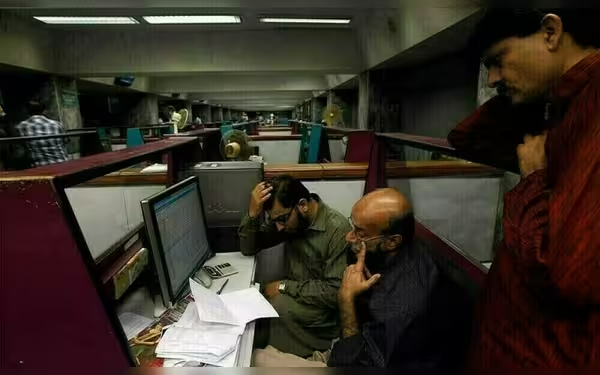Saturday, November 16, 2024 05:30 PM
KSE-100 Index Declines Amid Profit-Taking and IMF Discussions
- KSE-100 Index drops 424 points due to profit-taking.
- IMF delegation's visit triggers panic selling among investors.
- Pakistani rupee depreciates slightly against the US dollar.
 Image Credits: brecorder
Image Credits: brecorderThe KSE-100 Index fell by 424 points as investors engaged in profit-taking amid IMF discussions, reflecting market volatility.
The Karachi Stock Exchange (KSE) has been a focal point for investors, especially in recent weeks, as it has shown a positive trend. However, on Tuesday, the benchmark KSE-100 Index experienced a significant downturn, closing lower by 424 points. This decline was primarily attributed to profit-taking by investors who had previously enjoyed a period of gains.
From the start of the trading session, selling pressure was evident, which pushed the KSE-100 Index down to an intra-day low of 92,893.11. Fortunately, some late-session buying helped the index recover slightly, allowing it to settle at 93,224.56, marking a decrease of 423.76 points or 0.45%. Key sectors such as automobile assemblers, banking, fertilizers, oil and gas exploration companies, oil marketing companies (OMCs), and power generation faced notable selling pressure. Major stocks, including HUBCO, SNGPL, OGDC, PPL, NBP, and HBL, all traded in the negative.
According to Mohammed Sohail, the CEO of Topline Securities, the day’s trading was characterized by profit-taking. Another analyst pointed out that the visit of the International Monetary Fund (IMF) delegation, coupled with discussions about potential additional taxation measures, led to a wave of panic selling among market participants. Despite this setback, the stock market had been on an upward trajectory in recent weeks, buoyed by positive economic indicators such as a decline in the policy rate and improved remittance flows.
On Tuesday, the IMF delegation, led by Mission Chief Nathan Porter, held an initial meeting with Finance Minister Muhammad Aurangzeb. The delegation arrived in Pakistan on Monday to discuss recent developments and the performance of the Extended Fund Facility (EFF). Reports suggest that the agenda for the IMF-Pakistan meetings will focus on measures to reduce expenditure and enhance tax collection.
Interestingly, just a day prior, the PSX’s benchmark index had closed higher by 357 points, as traders took a moment to breathe after the index crossed the 94,000 mark for the first time during intra-day trading. In the international arena, Asian stocks saw a slight decline, while the US dollar maintained its position at four-month highs. The spotlight, however, was on bitcoin, which surged to a record peak, driven by investor optimism regarding potential tax cuts and relaxed regulations under a possible second term for Donald Trump.
In the midst of these developments, the Pakistani rupee experienced a minor decline against the US dollar, depreciating by 0.03% in the inter-bank market. By the end of the day, the currency settled at 277.93, reflecting a loss of Re0.07 against the greenback. Trading volume on the all-share index decreased to 792.90 million from 815.19 million on Monday, with the value of shares also declining to Rs30.79 billion from Rs37.32 billion in the previous session.
Pak Int. Bulk emerged as the volume leader with 79.86 million shares traded, followed by K-Electric Ltd with 71.76 million shares, and Pak Refinery with 56.36 million shares. A total of 454 companies had their shares traded on Tuesday, with 151 seeing an increase, 242 recording a fall, and 61 remaining unchanged.
While the KSE-100 Index faced a setback on Tuesday, it is essential for investors to remain vigilant and informed. The market's fluctuations are a natural part of trading, and understanding the underlying factors, such as economic indicators and external influences like the IMF discussions, can help investors make more informed decisions. As the situation evolves, keeping an eye on both local and international developments will be crucial for navigating the complexities of the stock market.













